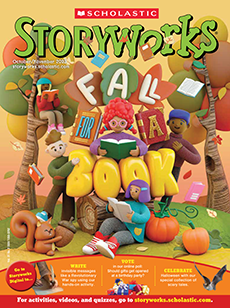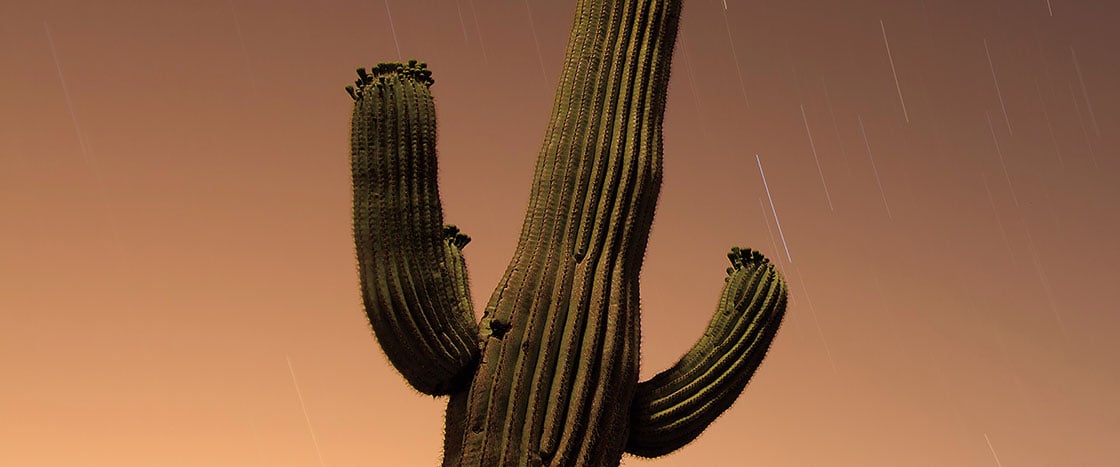I stand under the saguaro cactus in my front yard with my next-door neighbor, Calvin. The cactus towers over us, at least five times our height. Its trunk-like body and large curving arms reach for the cloudless Arizona sky.
“Oliver,” Calvin says. “I bet five dollars you can’t make that arm fall off.” He’s always betting me like this. Last week he bet five dollars I couldn’t catch a tarantula hawk, which is a nasty wasp. I ended up with the most painful sting of my life. But that was still better than having to deal with Calvin making fun of me at school if I’d chickened out.
A wooden support beam is wedged under one of the saguaro’s arms. My parents put it there to hold the arm up after a tree branch fell on it, causing it to nearly break off. I push on the beam, but it’s pretty stuck. “I don’t know,” I say, kicking at it lightly. “My parents are trying to save it.”
Calvin narrows his eyes and grins. “I’ll bet you 10 dollars.”
I’m tempted. I could put the money toward the new video game I’ve been wanting—Animal Crossing. But it’s still a bad idea. “Nah,” I say. “My parents might get mad.”
Calvin rolls his eyes. “You’re such a chicken.”
Here he goes again with his taunting. Why did that guy have to live next door to me?
I lean on the beam a little. “I don’t think so,” I say, but I’m sure Calvin senses he’s wearing me down.
“Fine,” he says. “Fifteen dollars. That’s all the money I have.”
Whoa. He’s never bet me that much before. Fifteen dollars would definitely be enough to buy Animal Crossing, and maybe Calvin would finally leave me alone once and for all.
I kick a little harder at the beam. It budges. I know I shouldn’t do it, but that arm is on its way out anyway. How long could it possibly hold on? “Deal,” I say.
I glance back at my house to make sure no one’s watching and kick at the beam as hard as I can. It moves about an inch. My toes sting, but I keep kicking it. The beam eventually clatters to the ground in a cloud of dust, forcing us to jump out of its way.
The saguaro arm sways and sags, but it doesn’t fall. Calvin pumps his fist. “You lose!”
“Not so fast,” I say, picking up a large rock. I chuck it at the arm. It bounces off, and the arm sways again. I start grabbing every rock I find and hurling them at the arm. It begins to tilt, finally twisting and tearing off at the joint, plummeting to the ground in another puff of dust.
“Yes!” I shout. There won’t be any teasing at school tomorrow, and with all of Calvin’s money gone, maybe not ever.
I stand under the saguaro cactus in my yard with my neighbor Calvin. The cactus towers over us, at least five times our height. Its large curving arm reaches for the cloudless Arizona sky.
A recent storm had nearly caused the cactus arm to fall down. My parents wedged a wooden board under the saguaro’s arm to hold it up.
“Oliver,” Calvin says. “I bet five dollars you can’t make that arm fall off.” He’s always betting me like this. Last week he bet five dollars I couldn’t catch a tarantula hawk, a nasty wasp. I ended up with the most painful sting of my life. But that was still better than having to deal with Calvin making fun of me if I’d chickened out.
“I don’t know,” I say, kicking at the cactus lightly. “My parents are trying to save it.” Though I can’t really understand what the big deal is about a stupid cactus arm.
Calvin grins. “I’ll bet you 10 dollars.”
“Nah,” I say. “My parents might get mad.”


